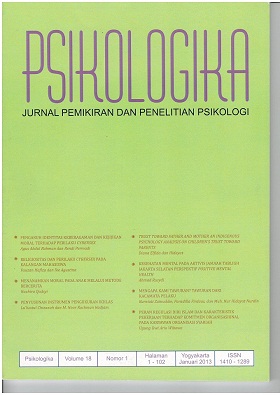Main Article Content
Abstract
Internet make human life easier. Internet enables human to communicate and share information virtually. Meanwhile, internet is sometime misused, such as for gaining sexual pleasure or cybersex. In this study, researchers examined the effect of religious identity and moral disgust on cybersex behavior. Researchers assumes that the identification of religious values and sensitivity to violations of these values can dencrease cybersex behavior. Cybersex behavior consisting of interactive and noninteractive aspect was measured by a cybersex behavior scale (cronbach'alpha = .89); Religious Identity consisting of internalization, religious affiliation, and symbolization is measured by religious identity scale (cronbach'alpha = .93), and moral disgust was measured by a moral disgust scale (cronbach'alpha = .91). Data were obtained from 166 students of Psychology of University X. The results of hypothesis testing using multiple regression analysis showed that religious identity and Moral disgust, both together (R = .483) or individually (â1 = - .325, t = -4256, p <.001; â2 = - .242, t = -3174, p = .002) showed a negative influence on cybersex behavior. In addition, religious identity and moral disgust showed a significant correlation (r = .440, p <.001).
Keywords : cybersex behavior, religious identity, moral disgust




